Reflections On The Dentist Office
Today I had to get my oldest son checked into his new dental office. No longer will he be accepted in the world of pediatrics.
Now most people HATE going to the dentist. However, since I wasn’t getting worked on, I was just mildly irked that the compilation of snow days, federal holidays and Doctor appointments have put my work schedule in a bad place.
As my son and I walked into the office lobby, I was bombarded by several things:
- The administrative assistant gave me the clipboard with several papers that had to be filled out – that’s normal for a new office.
- Sitting down to fill out tedious paperwork I sat my full coffee tumbler next to my chair. The administrative assistant informed me that no food or drinks were allowed in the office and this included the lobby. She perkily told me that after filling out the paperwork I would have to return my coffee to the car.
- I continued to fill out page upon page of papers with redundant questions before looking over to see another client waiting to see a dentist. She had … a water bottle. She’s allowed liquids?!
- I turned in the paperwork and took my coffee back to the car. As I re-entered the office I noticed 3 signs in the lobby telling me NO to food or drink in the office for purposes of cleanliness.
- I noticed yet another sign telling me that no children were allowed in the patient areas – boy would they find it interesting if I ever had to bring all four of my children with me.
- At least they had a TV to pass the time. The television was showing The Travel Channel’s Bizarre Foods show. I watched lamb blood being cooked in a stew and the scrotums being steamed and sliced.
- After a while of waiting for my son to finish getting his teeth cleaning, I had to use the restroom. With all the sign and told I had broken the rules with my coffee I didn’t know if dared go. Ironically, another client waiting went and asked permission to use the restroom. He was told, “Of course! You don’t have to ask.” Really?! Because I also felt the need to ask permission.

I have no desire to go back to this office even though everyone wore smiles on their faces and used polite etiquette. The administrative assistant even warmly bid me farewell as she held her coffee cup… FULL OF COFFEE. The whole environment made me feel not welcomed.
As I have helped other small businesses with their marketing, I believe that first impressions and customer hospitality are vital for the health of a business. However, the same can be true of raising a new foster child. It is imperative that foster parents make kids feel welcome when they come to their home.
5 Ways Foster Parents Make a Foster Child Feel Unwelcome
- Too Much Space or Independence
Some foster parents don’t want to overwhelm a child when they come into the home. It can be tempting to show the child their room and tell them to unpack on their own believing that they’re giving the kiddo some alone time to collect their thoughts. However, this kind gesture is actually a bit much for a child. Even a a teenager, who has never been responsible for a home let alone unpacking clothing, would appreciate the assistance of unpacking their clothes. It’s true that you don’t want to smother the child when they get to your home but they also need to feel like an adult on duty is making sure they are making the journey through life successfully. - Giving Chores Immediately
I have heard that some foster parents are quick to get kids in the habit of doing chores and being responsible for household tasks the first night. Just as giving the child too much space could give them a feeling of floating aimless through life, making them get to the grind of chores can also feel overwhelming. It also might be raising the bar for performance a bit too quickly. It would be good to give the new kiddo a few days to a week of simply getting to know everyone in the family, their new school and new surroundings. This can be work in itself. After this task, it might be time to SLOWLY raise the bar of expectation and begin adding them into the chore schedule. - Protecting From Information – Not Disclosing All Information to the Child
This is an area that I realize has many variables including age of the child and the serious nature of the child’s information. My suggestion is to error on the side of being very truthful with a child (of course again making sure the information is age appropriate). In my experiences children can intuitively tell when an adult is altering the truth or not telling them something. They also can tell when you are honestly admitting that you don’t know something about their situation or family history. When I feel that a group of people are hiding truths or fibbing to me, I do not feel welcome and have no desire to be around that group at all. - Quick to Correct
Especially when you receive your first foster placement, a parent has a tendency to have the mindset that they want to give a child a “better” life. This line of thinking can lead to wanting to correct behavior and etiquette to match the foster parent’s socio and economic climate. It is very unwelcoming to have someone correct your every behavior and parts of speech. You almost feel like your very person and personality is being rearranged. Set the bar low for your expectations. Does wearing a hat in a public building bother you? Let it go for a week or so. Does constant swearing get on your nerves? Live with it for a few days. It’ important that a new child feel welcomed. Am I saying that you won’t correct any behaviors? No. I’m merely attempting to communicate that you must wisely pick your battles. If there are 10 non-life threatening behaviors that you would like to correct in 30 minutes, let’s prune it back to just one. Then make sure you’re praising the child 3 to 6 times for every correction.
Think of it this way. If your favorite Hollywood actor/actress came to visit your home, you would do little to correct the behaviors they exhibited. You might eventually tell such a guest, “Excuse me, but I would appreciate it if you would stop the swearing.” However, for the most part you would put up with certain behaviors in order to make your guest feel welcome. There will be plenty of time to correct a child’s behaviors and you won’t be their only teacher. You might, however, be the only person they connect with and establish trust with. - Not Getting Attached
I hear this fear so many times in foster parent training classes. People are scared they will get deeply hurt because they love a child only to see them leave. Yes! Yes. You are going to get hurt. However, the children in your home need you to get close and to attach. They need to hear from the second they darken your doorstep to the day they leave that they are unique and special. They need to hear that they are talented and that they are loved. They even need to see proof of this love when they leave your home by getting a tearful hug goodbye. They need to have a voice. They need to be loved. They need to matter. Denying them these is the most disheartening and unwelcomed feeling. It goes beyond that though. If you can’t show a child how to have a healthy attachment, how will they learn to bond to others?
How do you handle things? How do you welcome a child into your home?
We want to hear about your tips and ideas. Comment below. Also, click on the banner below to see 5 simple ideas we have for making your home more welcoming for a foster or adoptive child.
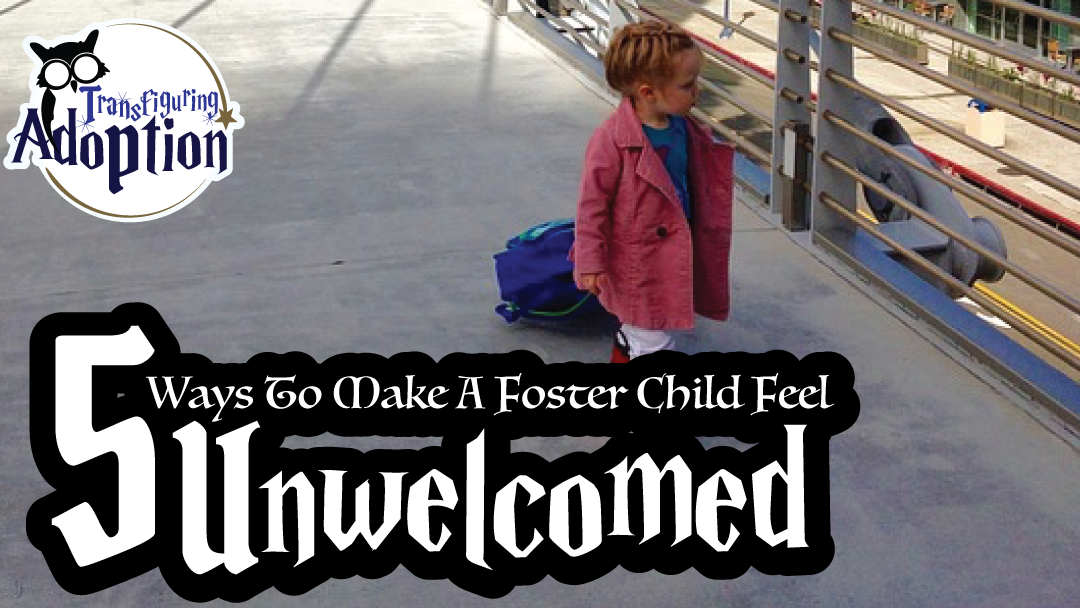
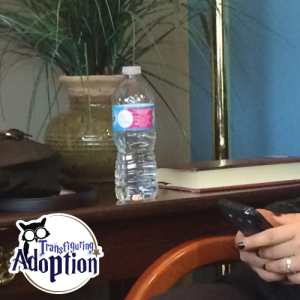
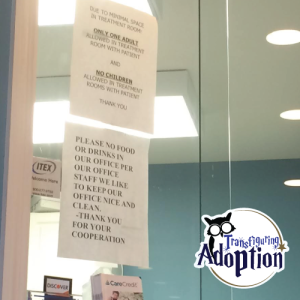
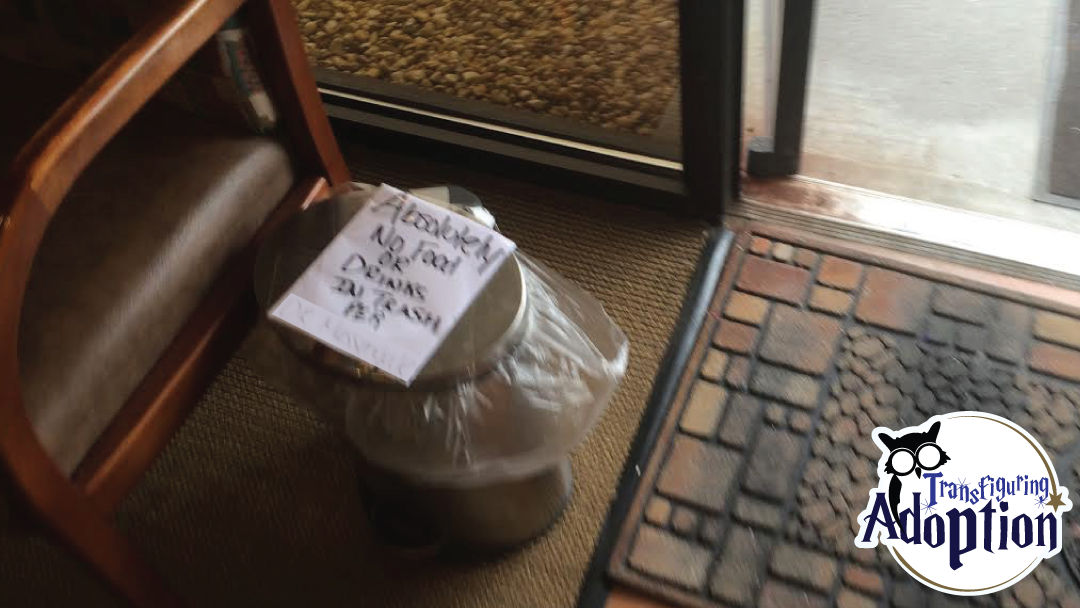
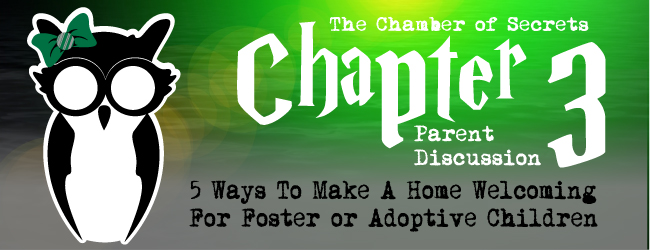
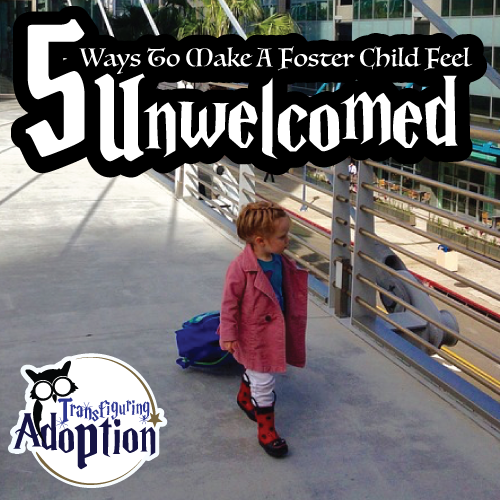
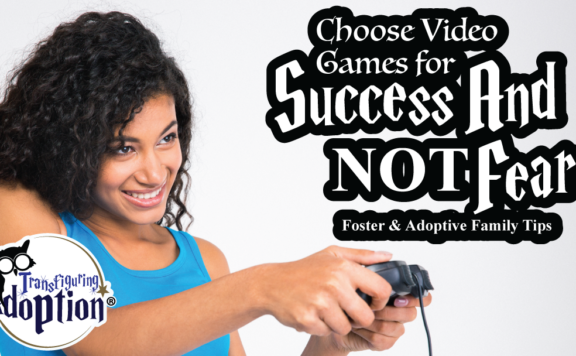
Eve and Ella
I can remember all of these happening to me at different foster homes – but never all of them at the same foster home (luckily!).